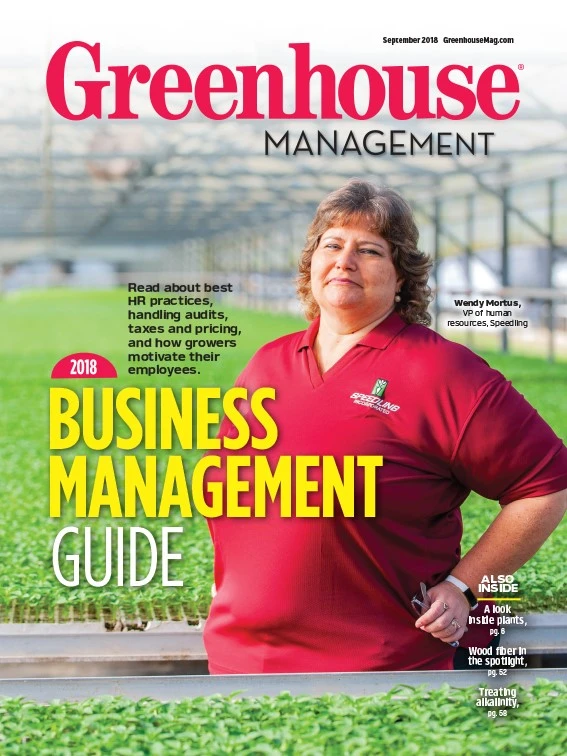
When plans go accordingly, a plant efficiently traverses through greenhouse bays, trucks, loading docks and retail shelves to successfully find its way to an end consumer’s garden or planter. Each time a crop is planted, grown and transported, people facilitate the process. But lately, these reliable people have been hard to come by, and retaining the best ones has become an ever-difficult task.
Managers throughout the wholesale supply chain must motivate and inspire their employees — from the plug stage to finish. Two growers in one of these chains are Speedling, a plug producer headquartered in Sun City, Florida; and American Farms, a finished plant grower in Naples, Florida.
Speedling produces vegetable and ornamental transplants and has more than 3 million square feet of production space between nine locations in Florida, Georgia, Texas and California, says Wendy Mortus, vice president of human resources. It grows about 75 percent produce and 25 percent ornamental transplants. It also manufactures expanded polystyrene for its plug trays and for other applications, such as boxes for transporting frozen fish.
American Farms is an ornamental grower with about 65 acres of production space that includes greenhouse space, along with full sun and shade houses. It receives about 20 to 25 percent of its plant material from Speedling, and much of the rest of it comes in the form of cuttings from overseas, says Alex Salazar, operations director. American Farms ships about 40 percent of its crops to Walmart, and the rest of it to independent landscapers and garden centers, and other growers.
At each of these businesses, the people are integral, and do everything from growing to accounting to supply chain logistics. Speedling and American Farms focus on a few key areas to earn and maintain their trust and respect: simply making them feel valued, keeping many of them on year-round and providing opportunities for them to advance in their careers.

Making employees feel valued
Like in other industries, some tasks in a greenhouse business can be tedious, resulting in employee frustration or burnout. Speedling aims to help its employees look for ways to improve the organization, rather than focusing on the monotony of a routine task, Mortus says. “We always encourage finding better ways [to improve], and we know that the people that are hands-on doing the job are the ones that usually will come up with ideas on how to do things better and easier,” she says.
Speedling offers awards to employees who work toward improving the company’s processes, Mortus says. These include an Above and Beyond award for employees who surpass expectations and a High Five award that managers can give to their employees to show appreciation. Speedling also hosts other events that employees can participate in. This year, as part of the company’s 50th anniversary, it hosted a contest to develop its anniversary slogan. Charlie Rodriguez, production manager at the business’ Alamo, Texas, facility won the contest with the slogan “Fifty Years and Still Growing Strong.”
For Salazar, developing a healthy relationship with employees starts with being respectful. “American Farms focuses on several aspects,” he says. “First of all is the very clear understanding that you do not use abusive language in any aspect whatsoever — that is essential. Sometimes managers think that every day is a Monday, and they have the tendency to lose their cool.” If an employee makes an error, he says, they should never be spoken to in a derogatory way.
Keeping labor year-round
The second thing that Salazar says American Farms does to retain quality labor is to keep employees working through the summer, between its busy spring and fall seasons. For the summer, the business reduces hours from busy 55 or 60-hour weeks to around its minimum of 35 hours — with the goal of continuing to support those employees and their families.
Salazar tells his managers to be creative with their employees, having them paint, make repairs, collect trash, weed, and grease and clean equipment. The benefit of having reliable employees who don’t need to be retrained outweighs the cost of rehiring and retraining more employees, despite that the dollar figures on their paychecks are larger than those of new arrivals. “How much money is it going to cost me to keep my labor, or how much money is it going to cost me to try to get new labor and retrain that labor for just one season and then go over the same episode again?” Salazar asks.
American Farms consistently runs a leaner workforce than many other greenhouse businesses so it can afford to retain its people, Salazar says. It does sometimes need to acquire some additional help. In these situations, Salazar calls local companies who provide labor, and those companies handle those workers’ compensation and payroll.
Similarly, Mortus says maintaining stability and avoiding constant layoffs is one of Speedling’s core values, adding that the company has an “according workforce” that includes a core group of year-round personnel that is supplemented during busy seasons with hires from farm labor agencies. The core group includes crew leaders and supervisors who manage others during busy seasons, then do more manual labor themselves when business is less hectic. “They’re familiar with the job because they’ve done it in the slower seasons, but they’re able to supervise and manage people in our busier time,” she says.

Providing opportunities for advancement
Much of the greenhouse industry is family-oriented, and many people in the business consider their colleagues to be like a second family, Mortus says. As industry members from various organizations often work together on addressing issues such as government regulations, she says Speedling employees support each other in various ways and work together in the community.
Every month, Speedling hosts a boot camp for new hires, Mortus says. “The goal of our week-long Boot Camp is to expose our new teammates to all the owners for each area of our organization and give them a ‘day in the life of’ experience for each department,” she says. “They soon find out that we are all one piece of a very large puzzle.”
Speedling also has an internal recruitment process for employees who are looking for advancement or a new opportunity within the organization, Mortus says. If an employee wants to apply for another position now or in the future, they can work with the company to plan next steps.
Meanwhile, American Farms offers competitive wages because it has to compete with other industries, Salazar says. One example of this is that more men used to perform manual labor, but now it’s more likely to be women; the men have gone to work in construction or other industries. He has adapted to these changes, noting that women are succeeding in these jobs, just as men have in the past.
American Farms hosts educational seminars and cross-trains its labor — from planting to irrigation to shipping, Salazar says. This fosters an environment where more work can get done with fewer essential employees. “Most of the people that work in our company have been here for many years because they like the environment,” he says. “They understand that they don’t have to be chasing the check.”
Having committed and trained workers means there is a first “line of defense” in the event of a production issue, Salazar says. The employee’s experience will serve the business well, the same as it serves the employee — and their family, if they have one. “You have to protect and to keep the people that have been loyal to you, working with you for many, many, many years,” he says. “Pay them well, treat them right and the results are going to be fine.”

Explore the September 2018 Issue
Check out more from this issue and find your next story to read.
Latest from Greenhouse Management
- Super Charged Moon Juice from Moon Valley Nurseries now available nationally
- 2025 Proven Winners Horticulture Scholarship applications now open
- How to improve inventory and shipping management in the greenhouse
- Leading Women of Horticulture: Anna Ball, Ball Hort, and Terri McEnaney, Bailey Nurseries
- GM CEA HERB Part 2: A guide to increasing the sowing density of culinary herbs
- GM CEA HERB Part 1: Best practices for producing culinary herbs in controlled environments
- USDA fires experts on invasive pests, including Asian citrus psyllid, chilli thrips
- CEA Alliance celebrates bipartisan introduction of Supporting Innovation in Agriculture Act






